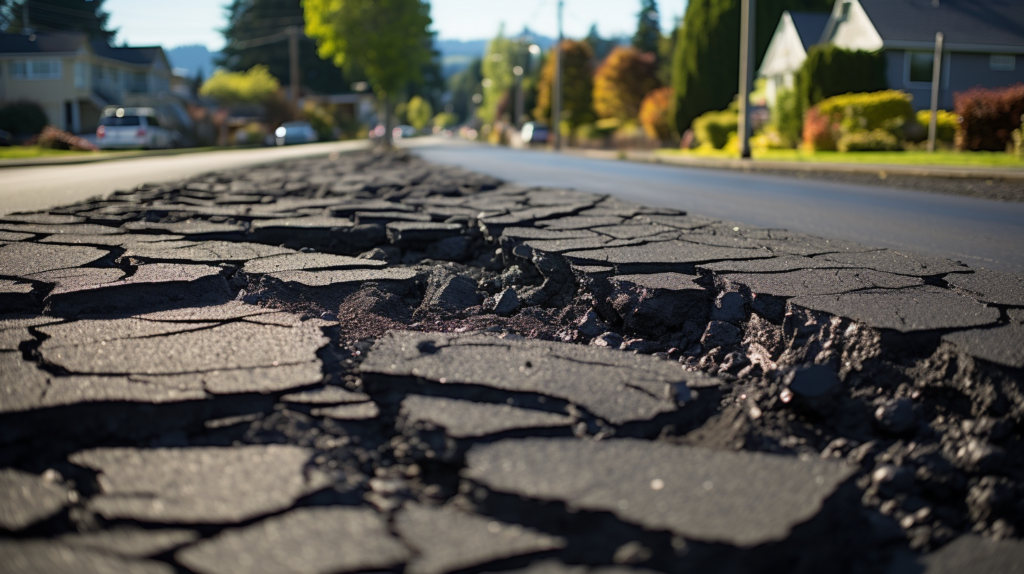Are you tired of seeing broken and cracked asphalt cluttering our landfills? Well, there’s a better way! Recycling asphalt is the key to sustainable paving, and it’s time for you to join the movement.
By excavating and sending old asphalt to recycling plants, we can create a high-quality product that requires fewer resources and is lighter for transportation. Not only does this reduce our dependence on oil and save on construction materials, but it also conserves natural resources and saves you money.
So let’s pave the way to a greener future with recycled asphalt!
Environmental Benefits of Recycling Asphalt
Recycling asphalt helps you reduce waste and debris in landfills while conserving natural resources and reducing oil dependence.
When asphalt is dumped in landfills, it adds to the accumulation of non-biodegradable debris. Instead, recycling facilities crush and screen old asphalt to create a quality product.
This process not only reduces the demand for expensive new asphalt but also saves on construction materials.
By reusing mineral particles from asphalt pavement, the process conserves natural resources. In fact, approximately 81% of removed asphalt from roads is recycled in the U.S.
This sustainable road construction option not only benefits the environment but also offers economic advantages. Taxpayers and contractors save money on transportation, energy, and material costs.
Moreover, using recycled asphalt improves pavement performance and reduces the likelihood of cracking, making it a cost-effective solution for paving projects.
Economic Benefits of Recycling Asphalt
You can save money on transportation, energy, and material costs by using recycled asphalt. Recycling asphalt offers numerous economic benefits.
Taxpayers and contractors save money by using recycled asphalt, as it reduces the demand for expensive new asphalt.
Additionally, it helps reduce the overall cost of transportation, energy, and materials required for paving projects.
By using recycled asphalt, you contribute to job creation opportunities in the recycling industry.
Moreover, this sustainable practice reduces the carbon footprint associated with traditional asphalt production.
It is a cost-effective solution that improves asphalt stiffness and reduces the likelihood of cracking.
By choosing recycled asphalt, you not only save money but also support a greener and more sustainable approach to paving.
Reduction of Oil Dependence Through Asphalt Recycling
By using recycled asphalt, contractors can decrease their dependence on oil and contribute to a more sustainable paving industry. Here are three key reasons why recycling asphalt is crucial for reducing greenhouse gases and minimizing the environmental impact of asphalt production:
- Reduction of Greenhouse Gases: Recycling asphalt reduces the need for extracting and refining new oil, which significantly cuts down on greenhouse gas emissions. By reusing existing asphalt, the carbon footprint associated with asphalt production is significantly reduced.
- Environmental Impact of Asphalt Production: The production of new asphalt involves mining natural resources and emitting harmful pollutants. Recycling asphalt helps conserve these resources and minimizes the environmental damage caused by extraction and production processes.
- Sustainable Solution: Incorporating recycled asphalt into paving projects offers a sustainable solution that reduces waste and promotes the efficient use of materials. It is an environmentally friendly alternative to using virgin asphalt, contributing to a more sustainable and greener construction industry.
Conservation of Natural Resources Through Asphalt Recycling
Using recycled asphalt in construction projects helps preserve valuable natural resources and minimize the environmental impact of asphalt production. By recycling asphalt, we can reduce the amount of landfill waste and minimize our carbon footprint.
The process of recycling asphalt involves crushing and screening old asphalt to create a quality product that can be used as a base or sub-base material for landscaping and construction projects. This not only diverts asphalt from landfills but also saves on construction materials.
By reusing mineral particles from asphalt pavement, we can conserve natural resources and reduce the demand for expensive new asphalt. Furthermore, using recycled asphalt can be a cost-effective solution for paving projects, saving taxpayers and contractors money on transportation, energy, and material costs.
Overall, recycling asphalt offers significant environmental and economic benefits while helping to reduce landfill waste and minimize our carbon footprint.
Cost Savings With Recycled Asphalt
Save money on transportation, energy, and material costs by incorporating recycled asphalt into your paving projects. Here are three reasons why using recycled asphalt can benefit your project:
- Reduced carbon emissions: Recycling asphalt reduces the demand for new asphalt production, which requires the extraction and processing of raw materials. By using recycled asphalt, you can contribute to reducing carbon emissions associated with the manufacturing process.
- Increased durability: Recycled asphalt offers improved pavement performance compared to traditional asphalt. It has been found to have better stiffness and reduced likelihood of cracking, resulting in a longer lifespan for your paved surfaces.
- Cost savings: Incorporating recycled asphalt into your projects can save you money. You can save on transportation costs as recycled asphalt is lighter and requires fewer resources for transport. Additionally, it reduces the demand for expensive new asphalt, resulting in cost savings for both taxpayers and contractors.
Versatile Applications of Recycled Asphalt
When incorporating recycled asphalt into your projects, you’ll discover its versatility for a range of paving applications.
Recycled asphalt can be used for driveway surfacing and landscaping projects, providing an environmentally friendly and cost-effective solution.
It offers excellent drainage properties, making it suitable for surfacing driveways and creating attractive walking, running, and biking trails.
Additionally, recycled asphalt can be used for parking lots and road resurfacing, improving pavement performance and reducing the likelihood of cracking.
By using recycled asphalt, you’ll not only save money on transportation, energy, and material costs but also contribute to the conservation of natural resources.
Its use as a base or sub-base material in construction projects further enhances its versatility and sustainability.
Embracing recycled asphalt is a wise choice for those seeking durable and eco-friendly paving options.
Improved Pavement Performance With Recycled Asphalt
You’ll notice a significant improvement in pavement performance when you choose to incorporate recycled asphalt into your projects. Here are three reasons why:
- Reduced Carbon Footprint: By using recycled asphalt, you contribute to a more sustainable environment. The process of recycling asphalt reduces the amount of oil needed and diverts asphalt from landfills. This helps reduce oil dependence, conserve natural resources, and decrease waste in landfills. It’s an environmentally friendly alternative to using virgin asphalt.
- Enhanced Durability: Recycled asphalt offers enhanced durability compared to traditional asphalt. It improves asphalt stiffness, reducing the likelihood of cracking and extending the lifespan of the pavement. This means fewer repairs and maintenance, saving you time and money in the long run.
- Cost-Effective Solution: Incorporating recycled asphalt into your projects can be a cost-effective solution. Taxpayers and contractors save money on transportation, energy, and material costs. The reduced demand for expensive new asphalt also helps lower overall project costs.
Overall, using recycled asphalt not only benefits the environment but also provides enhanced durability and cost savings for your paving projects.



